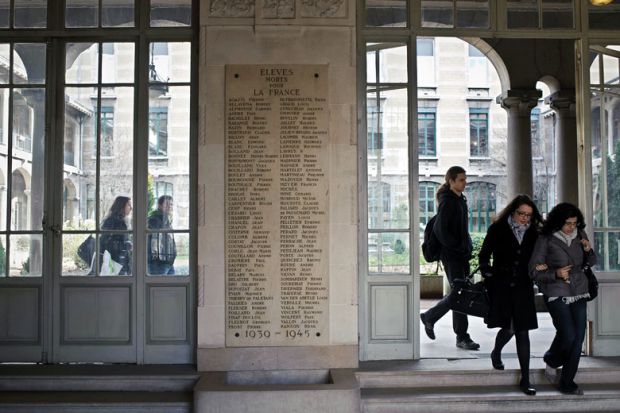New moves to broaden access to France’s socially elite grandes écoles show the country’s government taking a more interventionist stance on admissions, but deeper measures on social and institutional inequality will be needed to achieve real change, according to education experts.
Frédérique Vidal, France’s minister of higher education, research and innovation, met with grandes écoles directors earlier in the year to task them with proposing solutions on access. Eight institutions submitted their proposals to her this month.
Professor Vidal previously told Times Higher Education that Emmanuel Macron, the French president, had asked her to look at access to the grandes écoles. In April, Mr Macron announced a plan to abolish the most prestigious of the institutions, the École Nationale d’Administration, a move he billed as a response to the gilets jaunes protests and rising concern about social and geographical inequality.
Among the new access proposals, the highest-profile proposal was from the four campuses of the École Normale Supérieure, which said that they would explore the concept of awarding “bonus” points in their entrance examinations to disadvantaged students with scholarships.
Following the proposals, Professor Vidal, former president of the University of Nice Sophia Antipolis, announced that a sector-wide steering committee would be created to oversee the implementation of access “roadmaps” for higher education institutions.
France’s public higher education system is tripartite, with a steep social hierarchy between vocational education, universities and grandes écoles. Admission to a grande école is usually via a written entry exam, part of the concours system, preceded by two-year preparatory courses. These courses are often seen as a barrier to fair access and the new steering committee will look at alternative routes of admission.
The Ministry of Higher Education’s announcement on the access plans said that while higher education has an average of 38 per cent of scholarship students, the figure ranges between 11 per cent and 19 per cent in the grandes écoles. Professor Vidal wants the grandes écoles to match the average within five years.
Annabelle Allouch, associate professor of sociology at the University of Picardy Jules Verne, who studies the sociology of education and elites in Europe, said the grandes écoles plans “appear cosmetic in the sense that I very much doubt this will help diversify student populations”.
Allocating bonus points to scholarship students relies on the criteria for scholarships, and these awards sometimes go to middle-class students, she argued.
Dr Allouch also said that working-class students can be excluded from the routes that lead to grandes écoles long before higher education through “invisible channels” including “self-selection, choice of vocational tracks, lack of information on elite institutions”.
However, she said the access activity showed “major changes” in the government’s stance: “The state is taking over on topics like concours and widening participation despite grandes écoles’ great financial and political autonomy.”
Vincent Carpentier, a reader at the UCL Institute of Education and author of a 2018 paper comparing stratification in higher education in France, the UK and US, said there were “substantial inequalities of access to the French HE system and its various segments, so more scholarships and contextualisation of admissions…can be important”.
But he added that such measures “must be part of wider reforms to tackle the reproduction of inequalities [ranging across] society, secondary education, higher education to the labour market”.
This would require investment in schools and a “reduction in resource differentiation between the various segments of the HE system, which requires a revived public investment in underfunded universities”.




